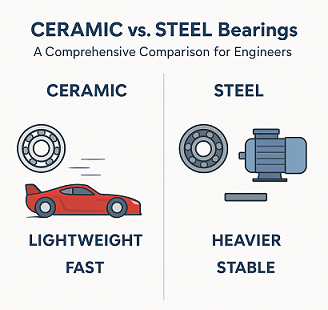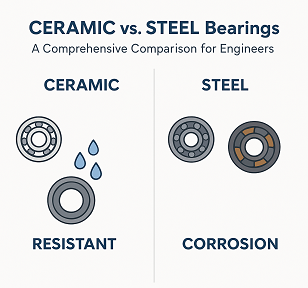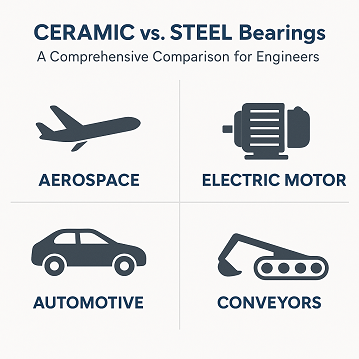Ceramic vs. Steel Bearings: A Comprehensive Comparison for Engineers
Choosing the right bearing material can significantly influence the performance, efficiency, and longevity of engineering systems. This article provides a comprehensive comparison of ceramic and steel bearings to help engineers make informed decisions for their applications.
Weight and Speed
One of the primary differences is weight. Ceramic bearings are lighter than their steel counterparts, which reduces rolling resistance and allows higher rotational speeds. This makes them ideal for aerospace, motorsports, and precision instruments where every gram matters. By contrast, steel bearings provide a heavier but stable option for general industrial machinery.

Corrosion Resistance
Unlike steel, which requires coatings or lubrication to resist rust, ceramic bearings are inherently corrosion-resistant. They perform well in environments exposed to moisture, chemicals, or high humidity. Steel bearings, while durable, are better suited for controlled environments or applications with effective lubrication systems.

Durability and Wear
Steel bearings have been the industry standard for decades, offering excellent load capacity and toughness. However, ceramic bearings are harder and more wear-resistant, extending service life in high-stress or high-speed conditions. Their hardness also means less deformation under load.
Conductivity and Electrical Insulation
In electric motors or applications where stray currents can cause damage, ceramic bearings act as natural insulators. This prevents electrical erosion, a common issue in steel bearings. For engineers working with sensitive equipment, ceramics provide a valuable advantage.
Cost Considerations
Cost remains a deciding factor. Steel bearings are more economical and widely available, making them suitable for large-scale industrial use. Ceramic bearings, while more expensive, justify the investment in high-performance applications where efficiency, speed, and low maintenance are priorities.
Application Scenarios
Ceramic Bearings: Aerospace, medical devices, high-speed spindles, electric motors.
Steel Bearings: Automotive, heavy machinery, conveyors, and general industrial equipment.

DEMY Bearing Solutions
At DEMY, we offer both ceramic bearings and steel bearings tailored to engineering needs. Whether your project demands lightweight precision, corrosion resistance, or cost-effective durability, DEMY’s product range ensures you have the right solution. Our bearings undergo strict quality control, guaranteeing performance across demanding applications.